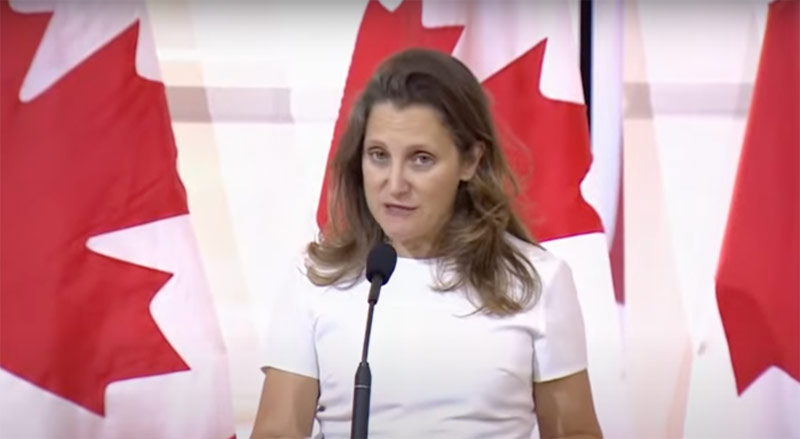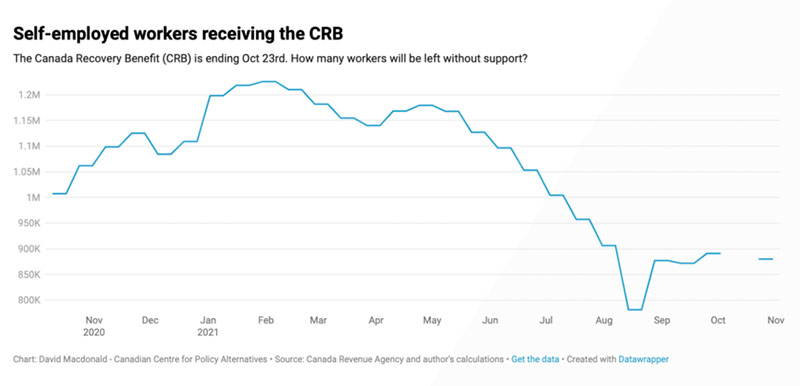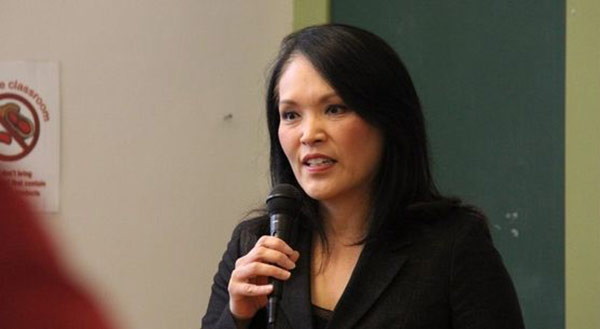D.J., who lives in Calgary, Alberta, first heard that the Canada Recovery Benefit would end on Oct. 23 from another person at her local Assured Income for the Severely Handicapped group.
“I thought, oh my god, that’s a little too soon for us,” said D.J.
D.J. works from home as a director of a small non-profit that works with schools. She asked that her full name not be used because she did not want to be seen as disparaging her organization. Her husband receives AISH, the Alberta government’s version of disability benefits, and D.J. currently works 10 hours per week, down from 22 in pre-pandemic times.
Finance Minister Chrystia Freeland announced last month that the Canada Recovery Benefit — along with the Canada Emergency Wage Subsidy and the Canada Emergency Rent Subsidy — would not be renewed, and instead replaced with a smaller benefit that will only be paid to workers who lose their jobs or have their hours cut because of government-ordered COVID-19 lockdowns.

D.J. received CRB to supplement her collapsed income for 27 “eligibility periods,” equalling 54 weeks — the maximum allowed under the program. Her organization did not qualify for wage subsidies, she said.
The Canada Recovery Benefit — which paid $900 every two weeks to eligible workers or self-employed individuals for the first 42 weeks of the program, before payments were reduced to $540 in July — replaced the earlier Canada Emergency Response Benefit.
Now, with no support, D.J. and others in similar situations face an uncertain future. “We’re a little stressed out right now,” said D.J., adding that there is little prospect of her work returning to normal anytime in the near future.
D.J. and her husband did not use their pandemic benefits to eat Cheezies and watch cartoons, as one United Conservative Party MLA suggested in September 2020.
Even before the pandemic, the couple struggled to make ends meet, particularly as D.J.’s husband’s AISH payments are clawed back if she makes more than $2,612 per month.
CRB was exempt from AISH clawbacks until June 30, meaning recipients were able to collect both benefits in full. During that time, D.J. said, “we were able to pay all the bills and actually eat. It’s the first time in almost 20 years that my husband and I have actually been able to live like human beings.”
D.J., who has Type 2 diabetes and a genetic condition that makes full-time, in-person work impossible, said her own health challenges mean that she may also need to apply for disability benefits soon.
CERB, which she also received, enabled her to pay $367 per month for a continuous glucose monitoring device, which allowed her to track her blood-sugar levels.
When payments were reduced under CRB, D.J. had to make do without that device. Now, she must return to her pre-pandemic struggles without the support of either benefit.

Hundreds of thousands of workers in limbo
D.J. and her husband aren’t alone.
In a recent analysis, David Macdonald, a senior economist at the Canadian Centre for Policy Alternatives, wrote that the termination of CRB cut off 880,000 workers from the benefit. While several other pandemic programs saw a significant decline in uptake in recent months, CRB did not.
In an interview, Macdonald said CRB was set up for self-employed workers who did not qualify for employment insurance, meaning there are no other means of government support available to them.
There is no guarantee that those who can work will be able to find suitable employment in the near future, he added.
“The economy still has not completely recovered,” said Macdonald. “We’ve recovered the number of jobs that we had in February 2020, but because the population has grown, we’re not at the same level of employment rate, because there’s more people looking for jobs.”
“In key industries, restrictions remain,” he added.
One of those self-employed workers now left without benefits is Arthur McGregor, a folk musician based in Kemptville, Ontario, and his wife, Wendy Moore, who together perform musical theatre as the Celtic Rathskallions.
Before the pandemic, the duo earned most of their income performing in public schools and seniors homes across Canada, as well as playing shows in the U.S. and Ireland. McGregor also plays in another duet, has a musical solo project and is vice-president of Local 1000 of the Canadian Federation of Musicians.
The last in-person show McGregor and Moore played was a few days before St. Patrick’s Day 2020 — right before the pandemic was declared. All future in-person shows were cancelled, and it took weeks before online performances were arranged.
Both McGregor and Moore received CERB and CRB throughout the pandemic. “There was no question it was a lifesaver,” said McGregor.
The duo cut down on day-to-day spending as much as possible, with the benefit of not having to pay the steep travel and accommodation expenses associated with touring.
“CERB was able to easily meet our expenses,” said McGregor, who was also able to set aside some savings. The couple must now use those savings to bridge the gap between the termination of CRB and the return of in-person performances — whenever that might happen.
“I’m confident that things will come back,” said McGregor, “but they’re not going to come back over the short run in the music industry.”
In the meantime, things remain uncertain for McGregor and Moore, who are searching for other jobs in the industry.
“Schools are not, I don’t believe, thinking really heavily about bringing in musicians to do this kind of thing — musical theatre, songwriting workshops and stuff like that,” said McGregor.
While various government programs have offered funding for venues and festivals, as well as discounts for schools to book musicians, that money doesn’t necessarily end up in the pockets of musicians, he added.

Constituents in ‘difficult’ situation, says NDP MP Jenny Kwan
Jenny Kwan, the NDP MP for Vancouver East, said she is concerned about the impact the federal government’s decision not to renew CRB will have on the arts and culture sector. According to Kwan, her riding has the highest per capita number of people employed in that sector in the country.
“The pandemic has hit them hard,” said Kwan, who has spoken to constituents who have seen live bookings dry up during the pandemic’s fourth wave.
“With the CERB and CRB ending, it places people in that very, very difficult situation,” she added. “It is a situation where people are saying, how are they going to make rent?”
Kwan noted that one of CRB’s eligibility requirements was that all recipients must be “seeking work” and “have not turned down reasonable work.”
“The assumption that they might just be looking to collect the CRB without working, that’s simply untrue,” said Kwan. “There are still a lot of people who are still out of work and unable to secure employment.”
“There are some industries that have not yet bounced back, and we need to recognize that those workers are equally impacted, and they continue to need to be supported,” she said.
Kwan added that the federal government must ensure that seniors who collected CERB and CRB do not lose the Guaranteed Income Supplement — some seniors, she said, have discovered their GIS has been cut off after receiving pandemic benefits.
“There’s some seniors who have already told me that if the government doesn’t address this issue, they are going to be without a home,” Kwan said.
No CRB, and no job opportunities either
D.J. said the fact that she and others like her relied on emergency benefits to cover basic expenses demonstrates that the current economic reality — even before the pandemic — is not sustainable.
“The rhetoric just serves to make people feel like they’re lazy, or like they just don’t want to work,” she said. “We need to put the tax dollars to work for all the people, whether it’s universal basic income [or something else].”
In the meantime, she said, “it’s probably going to be a game of OK, what bill doesn’t get paid this month so that we can eat, because that was what we were doing before.”
D.J. thinks the idea that the benefits needed to be cut to encourage people to go back to work amid “labour shortages” — a frequent complaint of business owners — is based on an unrealistic “pull yourself up by your bootstraps” mentality that ignores the conditions that she and others face.
Melissa Burkhart and her mother Pat Burkhart, who both live in Winnipeg, know all too well what it’s like to feel that their hardships are being ignored amid calls to send people back to work.
Melissa has fibromyalgia and receives disability support, which barely covers food, rent and basic medications, but not extended treatment. Melissa lives with Pat, who received CERB for the first three months of the pandemic after being laid off from her job at a lottery kiosk, before finding work at a hotel.
“I couldn’t have paid my bills without [CERB],” said Pat.
Pat was then laid off multiple times, most recently in August, and has received employment insurance payments since. However, she was recently notified by Service Canada that her EI payments will soon end.
Without the prospect of any additional government support or benefits, Pat said the future is “bleak.”
Despite putting out up to five job applications per week, Pat hasn’t been able to find work — she believes ageism plays a role in why she isn’t hearing back from potential employers.
“Without any extra benefits, I don’t know what we’re going to do,” she said.
“I don’t know how we’ll manage without it,” Melissa added. “Neither one of our incomes without it is liveable.”
Hearing recent media reports about “labour shortages” and employers claiming that they’re struggling to find workers because of pandemic benefit payments makes her angry, Pat said.
“I want to work, and I think most people want to work,” she said. “I find it very upsetting.”
“They’re saying these things coming from a place of power, from a place of privilege, where they’ve never been in this sort of a situation, where they’ve been desperate,” Melissa added. ![]()
Read more: Rights + Justice, Federal Politics, Labour + Industry
















Tyee Commenting Guidelines
Comments that violate guidelines risk being deleted, and violations may result in a temporary or permanent user ban. Maintain the spirit of good conversation to stay in the discussion.
*Please note The Tyee is not a forum for spreading misinformation about COVID-19, denying its existence or minimizing its risk to public health.
Do:
Do not: